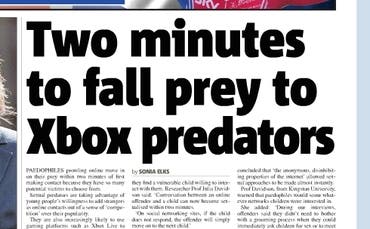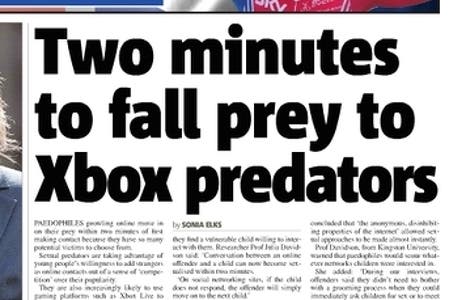Metro "Xbox paedophile predators" story "very unfortunate", says professor behind research
"Sometimes you get coverage that's frankly not very sensible."
The Metro's recent "Xbox paedophile predators" front page story was "very unfortunate" and "not very sensible", the professor behind the research it was based on has said.
This week the Metro, the London-based free newspaper, carried the front page headline: "Two minutes to fall prey to Xbox predators."
The main body of the article read: "Paedophiles prowling online move in on their prey within two minutes of first making contact because they have so many potential victims to choose from."
It continued: "They are also increasingly likely to use gaming platforms such as Xbox Live to target children, researchers say."
It turns out, however, that that's not what the researchers said at all. Julia Davidson, Professor of Criminology and Director of Research in Criminology and Co-Director of the Centre for Abuse and Trauma Studies at Kingston University, told Eurogamer the Metro had "misunderstood" the research.
"The focus of the study was not online gaming," she said. "It was just very unfortunate that the Metro misunderstood some of the central findings, shall we say. The comments we made were directed more towards social networking sites.
"Anywhere where kids hang out in large numbers on the internet provides the opportunity for offenders to search for them, and that includes social networking sites, chat rooms, peer-to-peer networks.
There was some evidence around PlayStation and Xbox, but very little to be honest with you. It was referred to in one or two interviews. But if you read the Metro article you'll see it's muddled.
"There was some evidence around PlayStation and Xbox, but very little to be honest with you. It was referred to in one or two interviews. But if you read the Metro article you'll see it's muddled.
"Sometimes you get sensible coverage and sometimes you get coverage that's frankly not very sensible."

The Metro's claim that paedophiles are "increasingly likely to use gaming platforms such as Xbox Live to target children" was "unsubstantiated", Davidson said.
"I don't think that's reflected in the research, and it wasn't that kind of study. You would really have to do a more detailed study to establish that. And it would be quite difficult to establish as well. This is a very difficult to research group, very difficult to access group, and you have to work in prisons to do the research as well. They're not a group to whom you can send a self-completion questionnaire. You actually have to go and speak to them.
"It's very unfortunate. Had it not said Xbox and said social networking sites I would have been happier."
The point of the study is really about child safeguarding rather than just reflecting on offending behaviour. It's about using offending behaviour to inform child safeguarding policy and criminal justice policy. So it is a serious study.
After the Metro's article was published, a "displeased" Microsoft got in touch with Kingston University to ask about the evidence. Davidson, who feels "caught in the middle", has appealed to the Metro to run a correction - so far to no avail. "We put our data out in good faith and have no control over how it's interpreted," she said.
Davidson was keen to stress that the research, freely available, was a serious work conducted by high ranking individuals over a long period of time.
"The point of the study is really about child safeguarding rather than just reflecting on offending behaviour," she said. "It's about using offending behaviour to inform child safeguarding policy and criminal justice policy. So it is a serious study.
"We know how these guys are operating and they are out there operating. It's very unlikely a child would be groomed, but having said that there is a serious risk."

